Zatoichi - Films 11 - 15
Zatoichi and the Doomed Man (1965) – 7.5
Director: Mori Kazuo
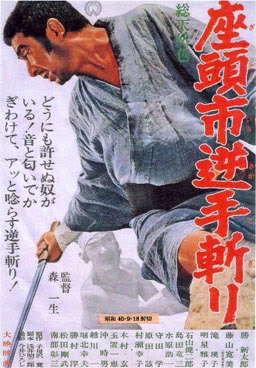
An early morning fog is rising from the
streets as light begins to break through the night in a small town. In the
fog you can see a murky figure approaching slowly, warily - the clickety-clack
of his cane on the cobblestone, the only sound to be heard. He is coming
to deliver justice and save a man from being executed. In the shadows some
forty men are waiting with traps and no mercy to stop him from doing so.
The first movement, the first sword is drawn and the killing begins.
This is the 11th film in the Zatoichi series
and a very enjoyable one. It always amazes me how with basically the same
plot outline these films can differ themselves within that structure, each
with a story that matters. The film begins with Zatoichi being punished by
the authorities for illegal gambling - 50 strikes of the cane. While in his
prison cell his next door neighbor had pleaded with him to go ask two people
who could save him from the gallows in two different towns much further down
the road. As Zatoichi begins his journey he says to himself, why do I always
help people - it always leads to trouble. Yes, it does. In the end as always,
Zatoichi doesn't stay around to count the dead but simply moves on to his
next adventure.
Zatoichi and the Chess Expert (1965) –
6.0
Director: Misumi Kenji
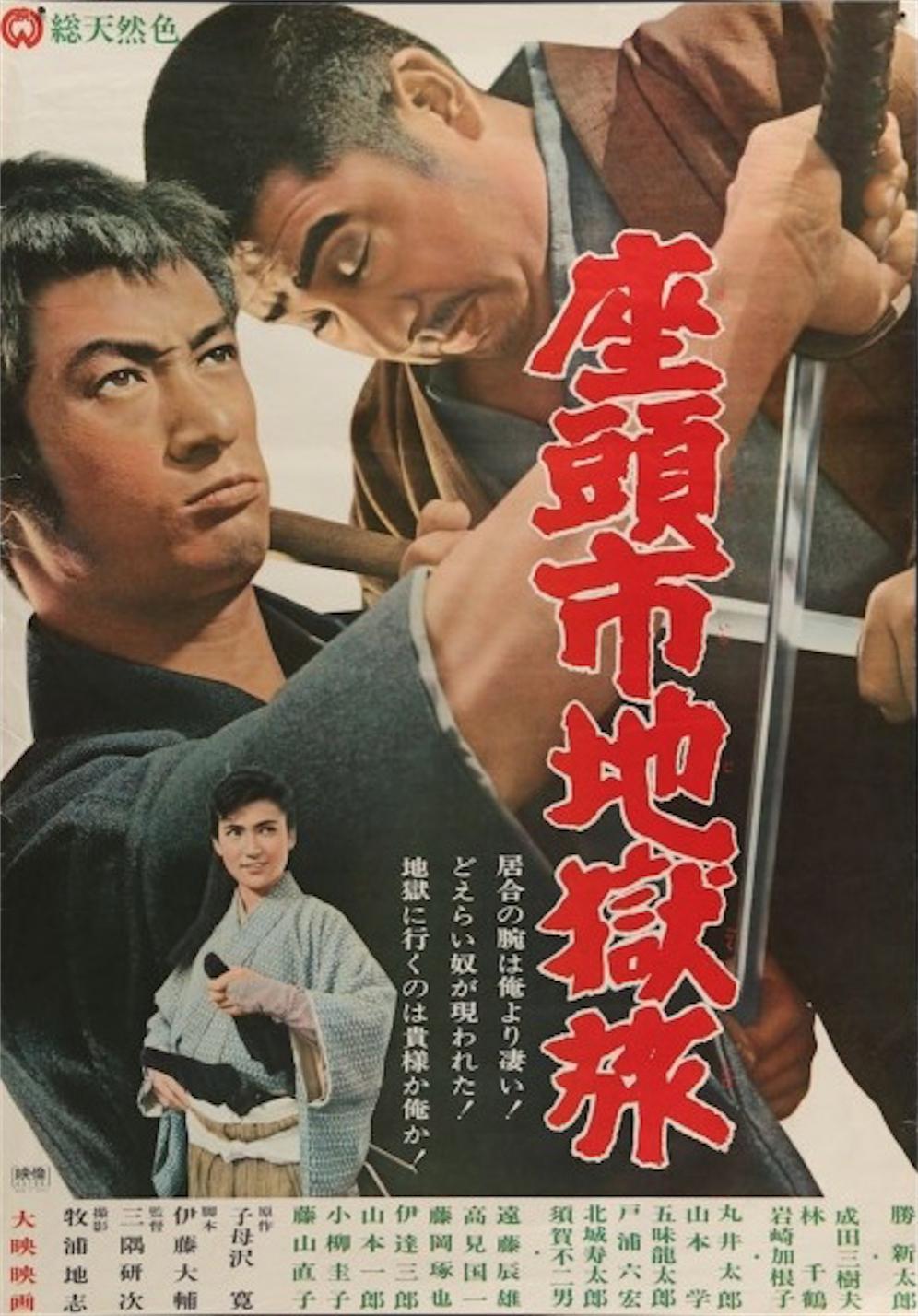
This is the 12th in the Zatoichi series
of films - directed by Kenji Misume who has a very nice resume of samurai
films to his credit going back all the way to the mid-1950's with a Tange
Sazen film. He already had directed two Zatoichi films - the first and the
eighth in the series as well as two from the Sleepy Eyes of Death series.
Later he was to direct more Zatoichi films as well as three from The Lone
Wolf films and one from the Hanzo the Razor films. That is a lot of sword
fighting scenes - so it is a bit surprising how little action there is in
this film. It almost feels like an afterthought.
There are a few threads in the film that
all finally connect in a field of death. While the opening credits are rolling
Zatoichi is surrounded by a group of men and attacked. He fights them off
and continues on his travels on a boat where he meets a Samurai down on his
luck who loves to play chess and a woman and her girl child. As usual he
gets into trouble gambling using a con to win. This gets him into further
trouble. People don't appreciate being conned by a blind man.
Other elements pop in to the story - the
girl gets sick and Zatoichi has to save her, her mother falls in love with
Zatoichi to which he tells her "I am dirt. Anyone who gets close to me gets
muddy". Or usually dead. A brother and sister also enter the story looking
for vengeance against the man who killed their father. They don't know what
he looks like but he plays chess. Hmmm. A little slow for my taste and only
a few short fights, but the films in this series change it up from film to
film - some with large action set pieces and others that are more intimate
with more drama. This was one of those.
Zatoichi’s Vengeance (1966) – 6.0
Director: Tanaka Tokuzo
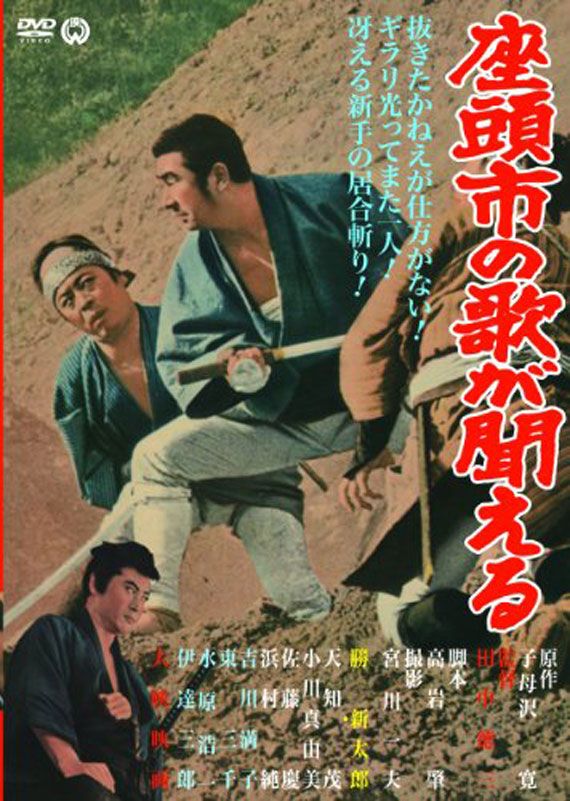
It has been a while since I watched my
last Zatoichi film, but it is nice to be back in familiar territory in this,
the 13th film in the series. Nothing actually ever much changes in these
films - a different village, a different gang, a different woman - but the
same killing field in which justice is dealt at the end of a cane sword.
The only surprise here was that some of the bad guys were left alive at the
end of the film. Not most, but a few.
Not much time is wasted as Zatoichi comes
across a group of seeming scavengers going through the pockets of a dying
man. Zatoichi naturally kills them all and the dying man asks him to take
his bag of money to Taichi and dies. Zatoichi has no idea who Taichi is or
where he lives but as movies will have it he goes to where someone told him
was a quiet town with no gambling - and there he comes across Taichi, a young
boy who soon has a Shane-like adoration for Zatoichi. But of course there
is a gang who have recently invaded the town and are forcing everyone to
pay up.
This is where Zatoichi always comes in
- they mock the blind man, tease him - and learn their lesson and look to
kill him. He wants to keep his sword seethed and stop killing, but that isn't
easy when you see people you care about being hurt. He also meets a prostitute
with a kindly disposition who invites him to stay for the night. For free
she adds. She is played by Mayumi Ogawa who has been in lots of films - the
most recent being Shin Godzilla in 2016. And there is also the Samurai who
wants to buy her out and can only get enough money one way. By killing Zatoichi.
He is played by Shigeru Amachi who had been in a bunch of Nakagawa Nobuo
films. It is directed by Tanaka Tokuzo who had previously directed New Tale
of Zatoichi and Zatoichi the Fugitive. This one is pretty standard boilerplate
but Zatoichi always fills a scratch I have.
Zatoichi’s Pilgrimage (1966) – 8.0
Director: Ikehiro Kazuo
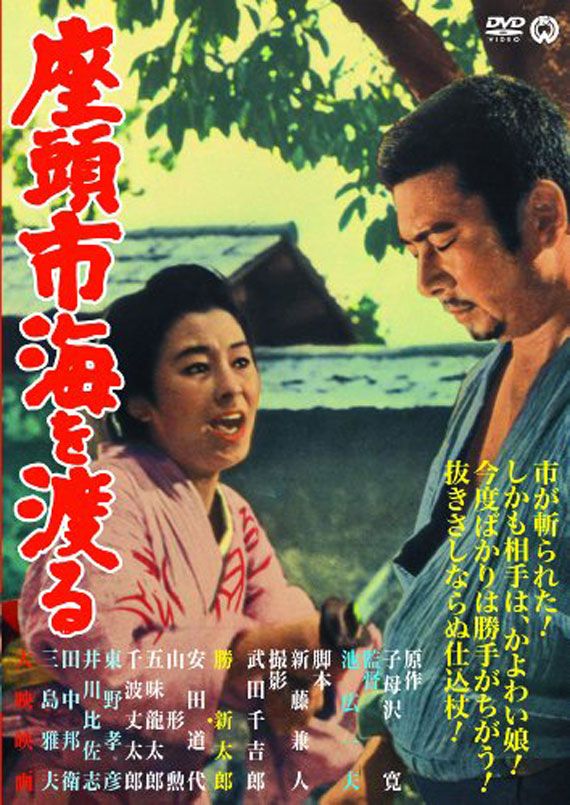
It is good to watch these Zatoichi films
with some distance in between. At a high level they all have basically the
same plot but what makes them each special are the little details within
each, the emotional resonance that they capture. This the fourteenth in the
series is one of the best so far with more than a touch of High Noon to it
with Zatoichi facing the bad guys who ride horses on a dusty street in a
no nothing town as the towns people cower within their homes and a woman
running from one home to another trying to shame them to come out and fight.
I almost expected Tex Ritter to sing a theme song in Japanese. The final
15 minutes of this is brilliant, maybe the best 15 minutes of any Zatoichi
film I have seen up to this point.
Zatoichi is as usual minding his own business
walking across a bridge. He is planning to visit 88 shrines asking God why
he has had to kill so many people and swears to kill no more. We know that
pledge won't last long. A man challenges him and Zatoichi has no choice but
to kill him. He follows the horse to the dead man's home and is immediately
attacked by the sister, Kichi (Michiyo Yasuda - who interestingly appeared
in the 2003 the Blind Swordsman: Zatoichi with Takeshi Kitano) - who wounds
Zatoichi but then relents and fixes his wounds. Her brother had been ordered
by the top Boss to kill Zatoichi to pay off a debt knowing the man would
be killed.
The tender but innocent relationship that
grows between Kichi and Zatoichi is very well done - she clearly is falling
in love but Zatoichi knows that he cannot stay - he is Yakuza with blood
on his hands and he cannot soil her. Of course, the Boss comes looking for
Zatoichi with a few more men than Gary Cooper had to face down - perhaps
30 and Zatoichi is forced to fight for his life. Quite wonderful.
Zatoichi’s Cane Sword (1967) – 8.0
Director: Yasuda Kimiyoshi
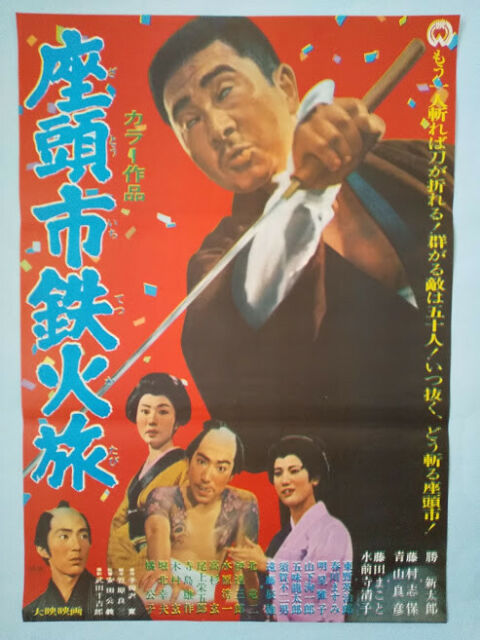
This is the fifteenth Zatoichi film in
the series and it hasn't lost a step. In fact, with the previous film and
this one the series seems to have been rejuvenated - these last two are close
to the best I have seen yet. Beautifully shot and paced by director Yasuda
Kimiyoshi who made many Chanbara films in the 1960s' including a few other
Zatoichi films, some Sleepy Eyes of Death and others. The big finale, which
all the Zatoichi films have when he cleans up the town and sends a lot of
ruffians to their resting place, is again brilliant - even better than in
the previous film - lasting about 20 minutes and going through a few scenarios
- but the shot of Zatoichi turning the corner at night with an umbrella in
hand, a light snow slowly dusting the street and men waiting everywhere for
him in the shadows is breathtakingly heroic - The O.K. Corral meets Lady
Snowblood captured in one glorious moment.
The film builds up to this convulsion very
slowly adding layer after layer of character and plot to make it all the
more effective. There is actually very little action until the end but that
end is worth the price of admission and more. By the fifteenth film the audience
had seen Zatoichi cut down his enemies by the truckload in film after film
and it was important to set it up so that it was meaningful. This one does
that so well. Zatoichi wanders into another small town near the New Year
on a cart that is bringing an entertainment troupe to it - on the cart a
young lady breaks into song and it was lovely - turns out she is Suizenji
Kiyoko, who was on her way to becoming one of the top Enka singers in Japan.
I have to see if I can find any of her music.
In town Zatoichi gets himself immediately
into trouble by winning at dice as he always does and then having to kill
two of Iwagoro's (Endo Tatsuo who has a dog face that always gets him cast
as a no-good-nik) men who think taking the money back will be like taking
candy from a baby or a blind man. But an old man - ex-swords maker - tells
Zatoichi that his sword has one more kill in it and then it will snap at
an invisible crack in it. That cane sword has seen a lot of blood in its
life, like an old friend to Zatoichi - always there for him and now it has
one kill left in it.
Zatoichi finds work as a masseur at an
inn and becomes fond of the people who own it and work there - he even performs
this weird duck song and dance - especially Shizu (Fujimura Shiho) who goes
out of her way to be kind to Zatoichi. When Iwagoro and his men begin to
move in on the inn - bringing in prostitutes, turning it into a gambling
casino and finally kidnap Shizu for a high ranking official to bed - you
see that expression come onto Zatoichi's face - he had earlier said he wasn't
willing to kill for strangers - a little weary about what he knows he will
now have to do. She is no longer a stranger. Kill everybody. With a sword
that has one kill left. It is terrific and like all these films provides
great period detail from costumes to houses and just the extras walking by.




